Kidney Dialysis Drugs Prevent HIV/AIDS Death; Shows Promise For New Treatment Options

A team of researchers have recently discovered that a common kidney dialysis drug is also effective at significantly slowing the progression of HIV to AIDS in animal trials. In addition, the drug was able to prevent one of the main causes of HIV/AIDS related deaths; microbial translocation. This amazing new information will be used to develop new life-saving HIV/AIDS drug therapies.
In a new study, it was found that Sevelamer, a drug commonly given to patients receiving kidney dialysis, can also significantly reduce the risk of death from HIV-related health complications. The drug is able to block bacteria in the guts from getting into the body through intestinal lining damaged by HIV, a process called microbial translocation. The gut bacteria attach to the medication and this makes it more difficult to escape into other parts of the body. Microbial translocation is one of the main causes of chronic activation of the immune system which weakens the immune system and allows the HIV virus to transition into full-blown AIDS. Microbial translocation also causes inflammation, which leads to heart disease, a major cause of mortality in HIV/AIDS patients. "These findings clearly demonstrate that stopping bacteria from leaving the gut reduces the rates of many HIV comorbidities," said Dr. Ivona Pandrea, professor of pathology at Pitt's CVR, in a recent press release..
Sevelamer was given to primates infected with the simian version of HIV, SIV. Sevelamer-treated monkeys were found to have lower levels of gut bacteria entering their bodies. This also caused the treated monkeys to have lower levels of a biomarker associated with excessive blood clotting. All these results suggest that heart attacks and stroke in HIV patients are more likely associated with chronic immune system activation and inflammation than the HIV drugs. "We now have direct evidence of a major culprit in poor outcomes for some HIV-infected people, which is an important breakthrough in the fight against AIDS," Pandrea explained.
This information will be used to test potential therapies aimed at slowing down or even stopping the key cause of death and heart disease in people with HIV. Unfortunately the treatment may not be suitable for HIV positive individuals that have already had severe gut damage caused by the virus. So far in clinical trials, the drugs were not successful in reducing microbial translocation in chronically infected patients. “Our study points to the importance of early and sustained drug treatment in people infected with HIV,” Pandrea added in the press release. Due to this researchers are currently working on alternative approaches. These include coupling Sevelamer with antibiotics, anti-inflammatory drugs, probiotics, or supplementation of existing HIV/AIDS drugs in order to further reduce the risk of microbial translocation.
Source: Kristoff J, Haret-Richter G, Ma D, et al. Early microbial translocation blockade reduces SIV-mediated inflammation and viral replication. The Journal of Clinical Investigation. 2014



























